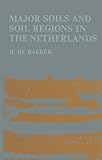Major soils and soil regions in the Netherlands [Libro electrónico] / H. de Bakker
Por: Bakker, H. de [autor/a].
Tipo de material: Libro
en línea Editor: The Netherlands: Springer, c1978Descripción: 203 páginas : ilustraciones ; centímetros.ISBN: 9400999860; 9789400999862; 9789400999848 (Online).Nota de acceso: Disponible para usuarios de ECOSUR con su clave de acceso Nota de bibliografía: Incluye bibliografía: páginas 200-203 Número de sistema: 56936Resumen:
Libro
en línea Editor: The Netherlands: Springer, c1978Descripción: 203 páginas : ilustraciones ; centímetros.ISBN: 9400999860; 9789400999862; 9789400999848 (Online).Nota de acceso: Disponible para usuarios de ECOSUR con su clave de acceso Nota de bibliografía: Incluye bibliografía: páginas 200-203 Número de sistema: 56936Resumen:| Tipo de ítem | Biblioteca actual | Colección | Signatura | Estado | Fecha de vencimiento | Código de barras |
|---|---|---|---|---|---|---|
| Libros | Biblioteca Electrónica Recursos en línea (RE) | Acervo General | Recurso digital | ECO400569368167 |
Incluye bibliografía: páginas 200-203
Disponible para usuarios de ECOSUR con su clave de acceso
Soil science in the Netherlands puts strong emphasis on the relationship between parent material and soil formation, and between physiographic conditions and land use. This approach, developed by the late Professor Dr C. H. Edelman ( 1903-1964), is quite understandable in a country where soils have to a great extent developed from alluvial and aeolian materials of recent geological origin. Dutch soil scientists have paid much attention to pedogenesis in fresh sediments, known as 'initial soil formation' or 'ripening', and to groundwater as a soil forming factor. Furthermore, human influence on soil genesis, in this land of man-made soils, has been tho roughly investigated. 'Major soils and soil regions in the Netherlands' clearly reflects these specific features of soils work in this country. In his book, Mr H. de Bakker, Head of the Soil Classification Section of the Netherlands Soil Survey Institute (Stichting voor Bodemkartering) addresses the special interests of foreign soil scientists and of students of earth sciences. The author examines representative soil profiles not only with respect to the Netherlands' system of soil classification- of which he is the co-author-but also in terms of some of the major classification systems used in other countries. It appears that a well characterized soil profile may find a very different place in various classifications and that even for a trained specialist it is often difficult to arrive at a specific determination within a given system. eng
Disponible en línea
Disponible en formato PDF
Subscripción a ELSEVIER 26 de diciembre del 2013
